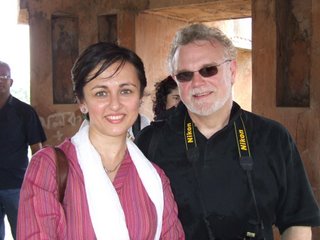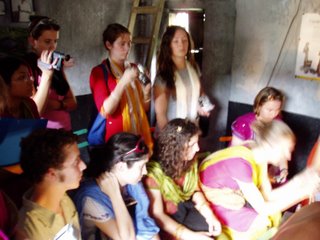Journey Into Bangladesh
me and gwen
 tony and sumira
tony and sumira the whole group on a trip to the metal-working village of dhamrai
the whole group on a trip to the metal-working village of dhamrai


Wednesday, August 09, 2006
our whole group
Journey Into Bangladesh This is an article that I was asked to write about our trip, and gather a few quotes from other students in its content. If you've read my blog entries, and then read this article, this is me writing for a Bangladesh newspaper. I don't think the information is different, but not so much critical, of course...... Journey Into By Eight weeks ago now, fifteen American university students embarked on a trailblazing journey to Methods of education are changing in the world, and this change is being co-created by both teachers and students. Our groups age range was eighteen to thirty-three years old, and this age range is reflective of the budding generation of leaders, business people, scholars, academicians, and trailblazers on the rise. Education is changing because the world is changing. The internet alone has opened up cultural mysteries, indigenous knowledge, and the level of awareness of the myriad of Peoples who inhabit this one earth. As a result of the rapid pace of change and development, the time has come that people of different fields need to know about other languages and cultures, in order to survive and grow in our bustling world. This is our purpose in coming to No matter what background, We soon understood that learning Bangla and learning of the Peoples who speak Bangla needed to go hand in hand. We werent here just to learn in a classroom and out of a book, but rather the streets of Dhaka and the lands of When you are in your own land, you are in a known place. You know how to dress, how to speak, how to eat, even going to the washroom. Like fish out of water, in the first few weeks we faced challenges of daily life. For the female students wearing more conservative clothing and realizing the gender differences between our lands was hard to swallow at times. After a week we all knew that it wasnt 40 taka to go from Baridhara to Gulshan 2, and started to get the hang of riding on the rickshaws and not feeling like youre going to fall out at any minute. By the end of week two we were already speaking, had completed the alphabet, and were ready to bargain hard in the market. The male students were sporting kurtas and the female students were trying a hand at wearing a sari, and of course the challenge of keeping it on throughout the day. We soon learned the secret of the safety pin. We became more adventurous with food, opening ourselves to the daily feast of Bangladeshi cuisine. Mishti dohi, fish-head daal, kaachi biriyani, begun bharta, lassi, chingri dopiyaza, rui maach, kebab, and rosh gula soon became part of our regular vocabulary. We took several short trips around Dhaka to the "Being someone who has never before been to a third world country, the beauty, joy and kindness I have found here surpassed my expectations" Lendy Krantz "I had no idea what to expect coming to Ann Marie Edquist We took two trips outside of "I was incredibly touched by the warmth of the people in the villages we visited. Entire families led us into their houses and fed us aam and mishti dohi." Kira Krown Our second trip was to We also visited Sufi shrines, Vaishnava Ashrama, learned of the tribal populations of This is another major aspect of participating in a cultural exchange: to learn about yourself. If our environment, language, fashion, and history make our cultural identity, then the journey of getting out of your known element can only help one to learn and grow into a better, more diverse and adaptable human being. To visit so many different cultural and religious sites in "Having the opportunity to experience firsthand such a diverse and deep-rooted culture has expanded my worldview and also the way I view my own cultural identity, not to mention giving a much-needed insight on the Bangla language itself." Gwen Kirk "Studying development economics in We are going back to our homeland awakened to more of our global reality, and knowing more about ourselves. This diverse group will no doubt apply what we have learned into our multi-disciplines, and have a burning desire to share with our communities and the world at large the reality of the traditions and life of |

0 Comments:
Post a Comment
<< Home